mysticism
Transform Your Chores Into Moments Of Zen
 I recently had to find my “inner zen” when I had to file my taxes in person. Even though I was really, really not in the mood and not looking forward to it at all, I decided to make the most of this dreaded chore by practicing a time-tested spiritual technique of just being present in the moment. This attitude made my day so much easier and more fulfilling.
I recently had to find my “inner zen” when I had to file my taxes in person. Even though I was really, really not in the mood and not looking forward to it at all, I decided to make the most of this dreaded chore by practicing a time-tested spiritual technique of just being present in the moment. This attitude made my day so much easier and more fulfilling.
As I waited in line at the tax office, I couldn’t help but overhear a less than happy man ranting in one of the booths. I felt bad because, well, we are all human and this is about paying taxes, for goodness sake! We can hardly blame others for reacting this way. I mean, who really enjoys doing their taxes?
But I think it’s better to stay calm and carry on, because in the end everything will be fine. Having a “panic attack” or “hissy fit” like the guy in that booth won’t change the situation, except to make it worse. I know from experience that keeping an inner calm always wins the day.
If you have to deal with a chore or task that you are not looking forward to, try to embrace it and immerse yourself in the experience rather than making it worse by creating a lot of resistance around it. There is a lot of ancient wisdom in “being present in the now.” It is no accident that this concept is rooted in various spiritual traditions and teachings throughout history, as it points to a universal truth that is essential for spiritual living and personal well-being.
The Mystical Phenomenon Of Levitation
 After seeing with my own eyes my yoga teacher levitate many years ago, I am convinced that levitation is not only possible, but that anyone can achieve it through a dedicated spiritual practice.
After seeing with my own eyes my yoga teacher levitate many years ago, I am convinced that levitation is not only possible, but that anyone can achieve it through a dedicated spiritual practice.
I used to attend weekly yoga classes led by a wonderful teacher who was 76 years “young” at the time. She was vibrant and lithe enough to make us younger ones look awkward by comparison.
One evening she invited her advanced students to watch a levitation demonstration. I must admit that I was a little skeptical and did not really know what to expect, but I am always open to new spiritual experiences.
She gave a talk before the demonstration, but I don’t remember much of what she told us. What I do remember very vividly is the incredible moment when she actually floated from her horizontal position on the floor. In a trance-like state, she rose gently and was suspended about a foot (30 centimeters) in the air.
Years later, I had another unusual levitation experience. After a wonderful week-long workshop at the Arthur Findlay College of Spiritualism and Psychic Sciences in Essex, England, a large group of teachers and students from the various classes gathered for a group meditation. The powerful energy in the room that evening was indescribable.
A Beginner’s Guide To Tasseography
 Tasseography is the ancient, yet little known, art of tea-leaf divination. As a little girl in the 1960s, I was fascinated to learn that the patterns of tea leaves at the bottom of my teacup had special meanings, so much so that I asked my mother never to use the tea strainer again!
Tasseography is the ancient, yet little known, art of tea-leaf divination. As a little girl in the 1960s, I was fascinated to learn that the patterns of tea leaves at the bottom of my teacup had special meanings, so much so that I asked my mother never to use the tea strainer again!
Tasseography, also known as tasseomancy or tealeaf reading, is a form of divination or fortune-telling that involves interpreting patterns formed by tea leaves or coffee grounds left in a cup. The practice has ancient roots and can be traced back to various cultures and regions, but it originated in ancient China, where tea was first cultivated.
Tasseography also has ties to Middle Eastern cultures, particularly in the Ottoman Empire. The practice spread through trade routes and cultural exchanges. In the Middle East, coffee grounds were often used for divination, and the leftover grounds would be interpreted for insights into the future.
Tasseography gained popularity in Europe in the 17th century, particularly during the Victorian era when tea became a fashionable beverage. It is also associated with the Romani people, who incorporated tea leaf reading into their traditions. As the Roma traveled and interacted with different cultures, the practice spread.
The Spiritual And Therapeutic Energies Of Blue
 In metaphysics, colors are associated with a specific energy signature or vibrational frequency that affects our aura as well as the energy fields in our surroundings. The energy signature of blue carries certain vibrational qualities that have both spiritual and therapeutic significance.
In metaphysics, colors are associated with a specific energy signature or vibrational frequency that affects our aura as well as the energy fields in our surroundings. The energy signature of blue carries certain vibrational qualities that have both spiritual and therapeutic significance.
In spiritual and religious contexts, this color is often associated with the divine and sacred, representing a connection to the heavens and the spiritual realm. The color blue also holds a significant place in various mythologies around the world.
From its celestial associations in Greek mythology, to its divine symbolism in Norse mythology, to its mystical significance in Celtic mythology, blue represents the vastness of the cosmos, the power of divine forces, and the enduring nature of wisdom and knowledge.
Blue is also traditionally associated with spiritual healing and purification and is considered a protective color. It is believed to have a calming and cleansing effect on the mind and spirit. It is also said to ward off negative energies and provide a shield against spiritual harm.
Beyond its spiritual symbolism, blue is considered an important color in color therapy for its various therapeutic effects that promote physical, emotional and spiritual well-being.
A Vision Quest For Intuitive Business Wisdom
 In business and finance, there is a mystical thread secretly woven into the fabric of success that is rarely recognized. It is an esoteric wisdom that transcends spreadsheets, profit margins, and market trends. This hidden and largely ignored business secret is known as intuition.
In business and finance, there is a mystical thread secretly woven into the fabric of success that is rarely recognized. It is an esoteric wisdom that transcends spreadsheets, profit margins, and market trends. This hidden and largely ignored business secret is known as intuition.
Intuition is a road less traveled in business, but I predict that it will become more prevalent in the future. One key development I foresee is that more companies will hire intuitive business consultants to help them with decision-making, alternative strategies, team building, trend forecasting, and so on.
Hiring an intuitive business consultant will become a business strategy that will elevate many companies beyond the mundane. Embracing intuitive wisdom in a business context isn’t just about unlocking business success; it’s about weaving a transpersonal narrative intertwined with the cosmic threads that lead us to a destination that transcends the ordinary. It is a destination where success is measured not just in profits, but in alignment with the cosmic forces that shape our business journey.
In my own entrepreneurial journey, I often found myself at a crossroads, faced with decisions that went beyond the boundaries of conventional understanding. It was during these moments of uncertainty that I began to long for a deeper, more intuitive perspective.

